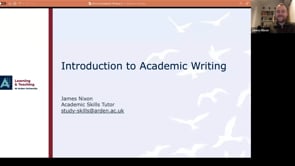-
Subject Guides
- Computing
- Criminal Justice
- Design and Creativity
- Digital Education in Practice
- Digital Finance
- Digital Marketing and Sales
- Engineering
- Health and Care Management
- Human Resource Management
- Institute of Foundation Studies
- Investigation, Security and Defence
- Law
- Leadership and Management
- Project Management
- Psychology
- Supply Chain Management and Logistics
- Tourism and Hospitality
- A-Z Databases
- Browse Journals
- Academic Skills
- English Language
- Other
What is this topic about?
With very few exceptions, your work will be assessed through your writing. It is therefore important that you develop a confident and versatile academic voice. If you’re new to Higher Education, academic writing can feel difficult; many students use their assignments to show off their vocabulary or write in long, complex sentences. However, this is not always necessary; good academic writing is clear and concise. These resources will guide you through the craft of academic writing and help you build positive writing habits.

Intro to Academic Writing

Developing Your Academic Voice

Understanding Your Feedback
Workshops
Introduction to Academic Writing
The Introduction to Academic Writing workshop is an introduction to the importance of certain practices within academic writing such as structuring, editing and proofreading your work. It highlights some of the conventions that are useful to adopt within academic practice as well as warning against practices that are not seen as academic. Introduction to Academic Writing is a good starting point for students hoping to improve their written work, we encourage students who have attended this workshop to attend the critical writing workshop to continue to build on what was learnt.
Paraphrasing and Synthesising
Mastering these paraphrasing and synthesising techniques will strengthen your academic voice and thinking, and will also help you avoid plagiarism. In this workshop, we will explore the fundamentals of these techniques and provide clear guidance on how to use them, using a journal article as a worked example. When used correctly, these skills allow you to demonstrate the depth of your subject understanding and your ability to combine relevant material from many sources into a unified whole.
Developing your Academic Voice
Developing your academic voice workshop focuses on the use of proficient academic language essential for clearly articulating and communicating your thoughts in both your spoken and written assessments. This will enable you to express yourself with more confidence whilst noticing what makes a good example of an academic voice.
How to Write an Argument
When it comes to expressing your ideas and exploring your research, language is everything. This workshop introduces students to the fundamentals of academic writing, and dispels some of the common misconceptions around the subject. Using practical examples, this workshop encourages students to find their own voice and to write in a way that makes the most of the available space. It explores fundamental concepts of structure of tone, gives guidance on comparison and synthesis, and acts as a primer to the conventions of academic writing.
Toolkit
Handout
Handout
Handout
Handout
Handout
Handout




